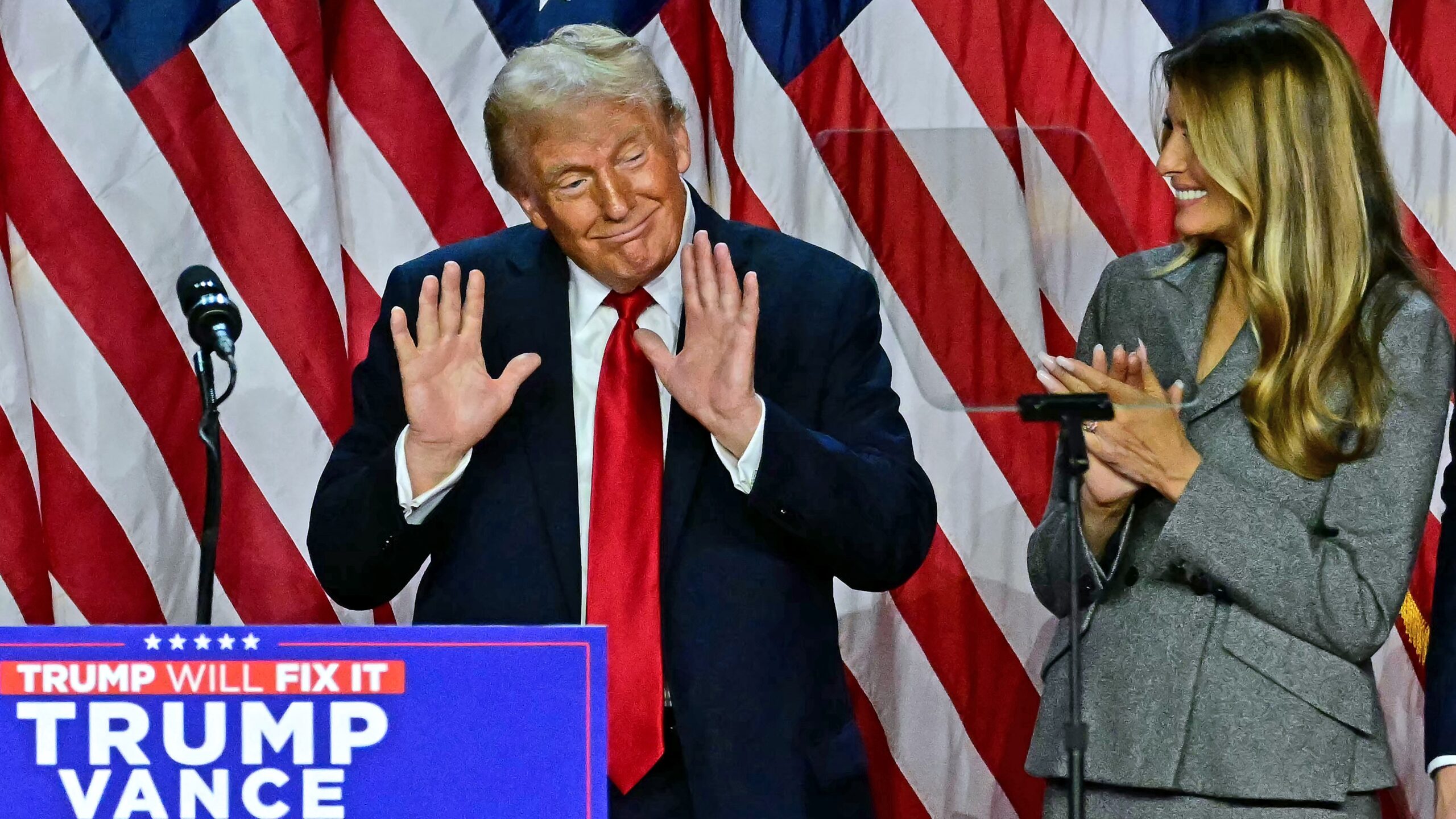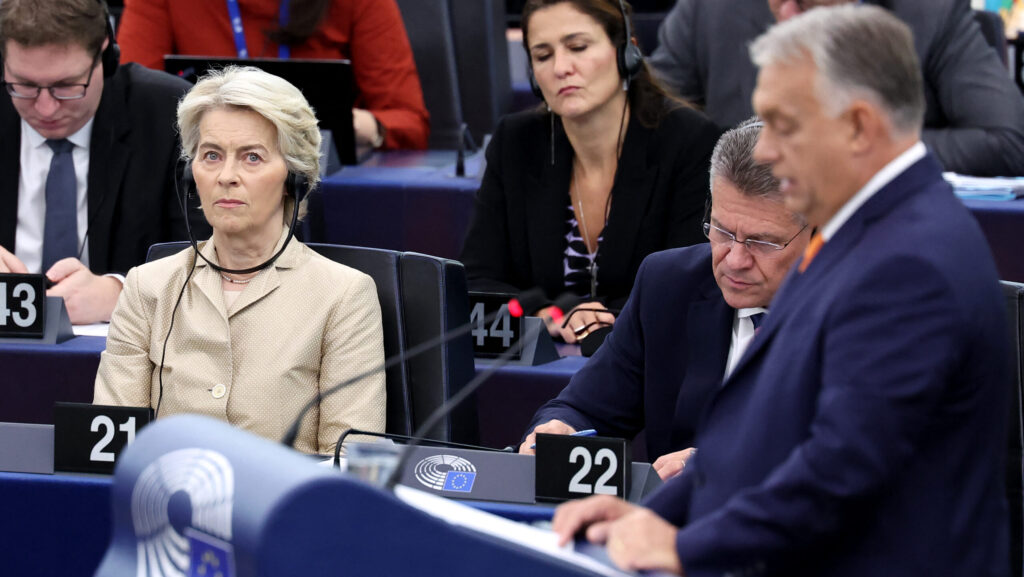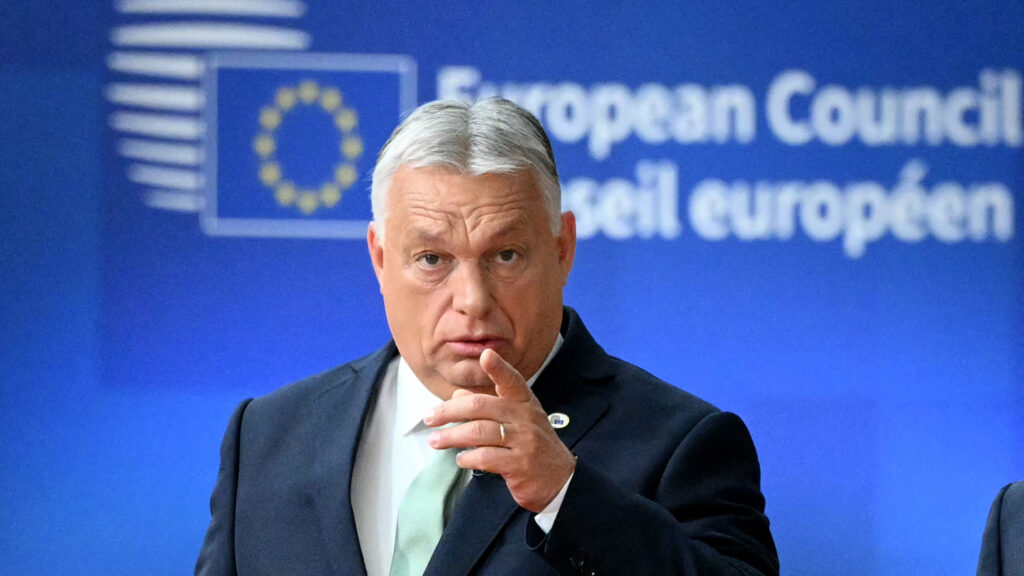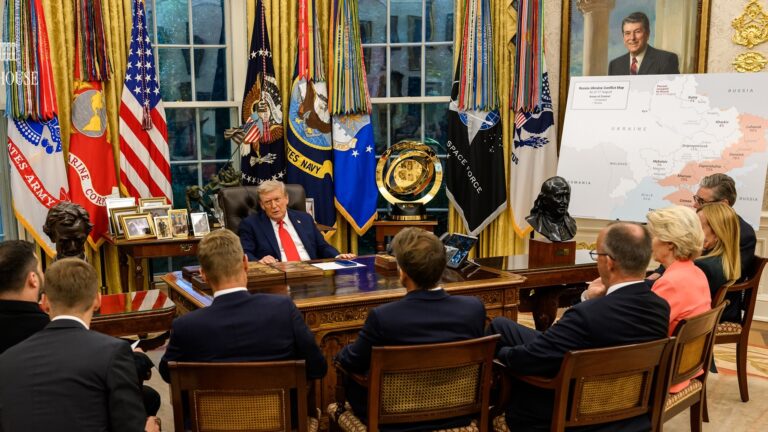An American saying has it that you should always be nice to people on your way to the top, because you are going to meet those same people on your way back down.
Ursula von der Leyen must be thinking some version of this when she arrives in Budapest today for the European Political Community summit. Thanks to the stunning results of the American election, the European Commission President will have landed in a country that she and other Brussels elites have treated as a near-pariah, but which is now set to become one of the most important nations in Europe.
Donald Trump’s sweeping election victory will reshape the European power landscape, catapulting Hungary from a state disdained by Washington, whose ambassador routinely and rudely lambasts his host country, into one of America’s most important allies. It is not good for Europe that it exists as a dependency on the American Empire, but that’s simply a fact. Now that Prime Minister Viktor Orbán’s good friend is about to return to the White House, Hungary gains the most powerful new ally imaginable in its dealings with its EU partners.
The days of bullying Hungary are over. Mrs. von der Leyen had better show her nicest manners. It’s important.
Viktor Orbán gambled audaciously on cultivating his personal relationship with Trump, and with grassroots American conservatives. He has long admired Trump, seeing in him a fellow populist of the Right, and co-belligerent against globalist hegemony of the George Soros kind. Their friendship is not fake. The mutual admiration of these leaders is not superficial.
‘The days of bullying Hungary are over’
But Orbán is also shrewd. He surely must have known how much personal loyalty means to Trump. The investment the Hungarian leader made in cultivating those close personal relations will now pay off, for the good of Hungary, and for Europe itself—whether or not the Brussels mafia knows it.
Orbán’s strategy of reaching out to grassroots U.S. conservatives will also bear good fruit in the next administration. He had little hope of appealing to Republican establishment figures in Washington; most of them agree with the absurd elite consensus that Hungary is some kind of fascist authoritarian country. This is the same kind of GOP blindness that led old-guard Republicans like Dick and Liz Cheney to endorse the loser Kamala Harris. If Hungary was to have hope, it would have to be through establishing a relationship with the MAGA grassroots.
The key event was the popular talk show host Tucker Carlson’s week-long visit to Hungary in August 2021. Carlson, whose Fox News show at the time was the No. 1 rated program of its kind in America, broadcast for a week from his perch atop the Matild Palace hotel in Pest and told a story about Hungary that no Americans had ever heard. Carlson showed Americans that they had been lied to by their politicians and their media—that Hungary was in fact a country that was doing a lot of things right.
That opened doors. Then, in 2022, Prime Minister Orbán flew to Texas and made a speech at CPAC, the influential annual meeting of conservative activists. This was another bold stroke to bypass the hostile American establishment, and speak directly to Trump voters, to let them know that all they had heard about Hungary was fake news. He showed them that although most of Europe looked down on them, they had true friends among the Magyars.
It was a risky move for a national leader to make at a time when the sitting U.S. president was an enemy of Trump’s. But it might have been riskier for Orbán to have stayed home. The hatred of Hungary under Orbán’s leadership by official Washington has been visceral. This past autumn, several informed observers in DC warned me that if Kamala Harris won the fall election, her government would punish Hungary hard for its opposition to NATO policy in Ukraine.
But Kamala Harris lost. Now little Hungary is on the verge of becoming one of America’s closest European allies, and Viktor Orbán, loathed by Brussels bureaucrats and European media, into one of the most powerful leaders on the continent, by virtue of his close relationship with the incoming American president. Viktor Orbán gambled, and hit the jackpot.
We will almost certainly see a huge shift in NATO’s Ukraine policy. The unsuccessful Orbán peace mission, seeking an armistice between Russia and Ukraine, will no doubt be revived in the first months of the new Trump government. Hungary will soon play a central role in ending that terrible war.
Along those lines, there is no doubt that the Trump government will pressure European nations to spend more money on their own defense. America will always have Europe’s back, but the era of parasitically depending on the United States to pay the defense bill for European governments who prefer to spend money on domestic welfare programs, is over. That will be tough medicine for Europe, but it’s necessary.
Second, Brussels can no longer afford to treat Hungary with such contempt. Like it or not, when Washington says ‘jump,’ Europe says, ‘How high?’ The incoming administration should investigate how its predecessor sought to punish a sovereign, democratically elected government simply because it hated that nation’s politics. It is hard to imagine that the Trump administration will view the European Union pushing Hungary around, especially on migration policy, with favor or indifference.
Indeed, a big reason for Trump’s victory is the anger American voters had over mass migration, which surged to record levels under Joe Biden. The new order in Washington, with MAGA Republicans in charge in the White House and in both houses of Congress, will finally get serious about addressing this crisis.
Similarly, there is a good chance that the U.S. under Trump will pressure European leaders to get control of the continent’s porous borders. At the very least, European opponents of mass migration will have a powerful new ally across the ocean and can no longer be dismissed as right-wing extremists and xenophobes. For once, populist, anti-migration parties across Europe have every reason to be excited about the future.
The new U.S.–Hungary relationship will also pay off for Trump, and for America. For one, though Budapest and Washington are not likely to agree on China, architects of Hungary’s new ‘connectivity’ policy can help the American government figure out a new strategy for dealing with a rapidly changing world order, in which U.S. power is declining relative to rising powers.
‘The new U.S.–Hungary relationship will also pay off for Trump, and for America’
One should not expect Donald Trump to support policies that make America weaker. But Trump almost certainly knows that the hubris of the U.S. Government, which has foolishly behaved as if there were no problems in the world that it couldn’t solve with money and military might, actually diminishes American strength.
Hungary and America will never agree on China, but it will do the incoming Trump administration a lot of good to get the advice of a trusted ally on how to proceed, as opposed to listening to the talking heads inside the swamp of Washington think tanks and policy shops.
America under Trump will also benefit from the domestic political insights of Orbán and Fidesz. Over a decade ago, Orbán understood that the West had entered a postliberal era, and that conservative leaders who wish to succeed must adjust to that fact. Specifically, illiberal progressives had taken control of both governments and the institutions of civil society—banks, NGOs, industry, media, academia—and used them to force policies on peoples without democratic accountability.
In the United States as in Europe elite networks both inside and outside of government forged alliances that imposed managerial liberalism on voters, whether they liked it or not. For example, in America, the university system is entirely captured, ideologically, by the Left. When J.D. Vance a few years ago gave a speech declaring ‘universities are the enemy,’ he was not only correct, but as a graduate of Yale University’s Law School, the most important one in America, he knew what he was talking about.
Viktor Orbán faced a similar situation when he took power in Hungary, and he knew that conservatives were at a power disadvantage—even when they held a democratic mandate from the people. He understood that the only way conservatives outside of these elite networks could even the odds was through using the power of the state. This is true in America as well, but Republicans have been far too reticent both to recognize how the world had changed, and to use their authority to fight back effectively against left-wing illiberalism.
That will change under the new American government, which comes to power behind an astonishingly diverse electoral coalition. In a single stroke, U.S. voters demolished the racist progressive idea of ‘diversity.’ Donald Trump earned a shocking number, for a Republican, of votes from Latinos and black Americans. It turns out that many of them don’t like the left-wing authoritarianism of the Democratic Party, which presumes to speak for them, and which, in its blind arrogance, has no idea how illiberal it has become.
The last time Trump was in power, he underestimated how devious and effective the liberal establishment would be in trying to destroy his presidency and its policy goals. He has surely learned his lesson. If he wants to know how to defeat these enemies, Trump should dispatch advisers to Budapest to learn from a government that has been doing so since 2010.
Finally, Prime Minister Orbán’s dream that Budapest would one day become the intellectual capital of conservatism is on the verge of coming true. He told me and others in 2019 that this is what he hoped to see. It sounded far-fetched at the time, but he has steadily made inroads and built relationships with U.S. conservatives who began as skeptical of the demonization of Hungary. Now the influx of conservative policymakers, strategists, and journalists to Hungary, where they can meet, think together, build networks, and strategize, will commence.
Donald Trump’s victory signals a bright new day for America. On the morning after the U.S. election, the sun also rose over Hungary. Times have changed, Mrs. von der Leyen. Deal with it.
Read more on the US presidential election:







